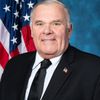Anthony Hustedt-Mai
Anthony Hustedt-Mai (Republican Party) is running for election to the U.S. House to represent Indiana's 4th Congressional District. He declared candidacy for the Republican primary scheduled on May 5, 2026.[source]
Hustedt-Mai completed Ballotpedia's Candidate Connection survey in 2025. Click here to read the survey answers.
Biography
Anthony Hustedt-Mai's career experience includes working as a consultant. Hustedt-Mai served in the U.S. Navy from 2002 to 2023. He earned a Ph.D. from Purdue University in 2011.[1]
Hustedt-Mai has been affiliated with the following organizations:[1]
- American Legion
- Veterans of Foreign Wars
- Disabled American Veterans
- Mental Health America
Elections
2026
See also: Indiana's 4th Congressional District election, 2026
General election
The primary will occur on May 5, 2026. The general election will occur on November 3, 2026. General election candidates will be added here following the primary.
Democratic primary election
Democratic primary for U.S. House Indiana District 4
The following candidates are running in the Democratic primary for U.S. House Indiana District 4 on May 5, 2026.
Candidate | ||
 | Drew Cox | |
| Roger Day | ||
 | Darin Patrick Griesey | |
 | Thomas D. Hall Jr.  | |
| Robert Lovely | ||
 | Joe Mackey | |
 | Jayden McCash | |
| Paul McPherson | ||
 | John Whetstone | |
 = candidate completed the Ballotpedia Candidate Connection survey. = candidate completed the Ballotpedia Candidate Connection survey. | ||||
| If you are a candidate and would like to tell readers and voters more about why they should vote for you, complete the Ballotpedia Candidate Connection Survey. | ||||
Do you want a spreadsheet of this type of data? Contact our sales team. | ||||
Republican primary election
Republican primary for U.S. House Indiana District 4
Incumbent Jim Baird, Chad Elwartowski, Craig Haggard, Anthony Hustedt-Mai, and John Piper are running in the Republican primary for U.S. House Indiana District 4 on May 5, 2026.
 = candidate completed the Ballotpedia Candidate Connection survey. = candidate completed the Ballotpedia Candidate Connection survey. | ||||
| If you are a candidate and would like to tell readers and voters more about why they should vote for you, complete the Ballotpedia Candidate Connection Survey. | ||||
Do you want a spreadsheet of this type of data? Contact our sales team. | ||||
Endorsements
Ballotpedia is gathering information about candidate endorsements. To send us an endorsement, click here.
Campaign themes
2026
Ballotpedia survey responses
See also: Ballotpedia's Candidate Connection
Anthony Hustedt-Mai completed Ballotpedia's Candidate Connection survey in 2025. The survey questions appear in bold and are followed by Hustedt-Mai's responses.
| Collapse all
- Restore Constitutional Principles: Put the U.S. Constitution back at the center of policymaking, ensuring that every law and decision respects the founding principles of liberty, limited government, and individual rights.
- Protect American Families and Communities: Prioritize public safety, border security, strong education, and support for law enforcement, veterans, and working families to build stronger, safer communities.
- End Career Politics and Restore Accountability: Support term limits, demand transparency in government spending, and ensure elected officials remain accountable to the people, not special interests or party elites.
Mental Health: Working with veterans, groups like Mental Health America, and everyday constituents, I’ve seen how we need to improve access to mental health care, strengthen community-based support systems, and address causal mechanisms that impacted the wellbeing of Americans.
I look up to leaders who have shown unwavering integrity, courage under pressure, and a commitment to doing what’s right, even when it’s not popular. I look up to those who I have served with, those who work hard every day to better their community, those who dedicate their lives to others; essentially anyone who serves a greater purpose than themselves.
“Democracy in America” by Alexis de Tocqueville, examines the United States as it transitioned from a fledgling nation into a power of its own, and places our history within the greater trend of humanity fighting for the liberty and the rights of man, the birth of democracy.
Just about anything from Abraham Lincoln, particularly his “House Divided” Speech. This speech captures the importance of moral clarity, national unity, and leadership grounded in principle, values that I strive to carry forward in public service.
Transparency and honesty are equally critical. Leaders should communicate openly with their constituents, make decisions based on facts and principles, and accept responsibility for their actions. Finally, a true public servant must have the courage to put the needs of the people above party politics, special interests, or personal ambition, always remembering that the office is a position of trust, not entitlement.
I’m also grounded in constitutional principles and have spent years studying and teaching issues like national security, terrorism, and American governance. I’m not running to build a career in politics, I’m running to serve, to listen, and to fight for the people of my district with honesty, courage, and resolve. I believe in doing what’s right, not what’s easy, and I’ll carry that mindset with me to Washington
That means listening to constituents, introducing and voting on legislation that reflects their needs and values, and maintaining oversight of federal agencies and spending. It also involves being a strong advocate for local and regional concerns on the national stage, working to secure resources, support, and solutions for the communities you serve. Above all, the role requires constant vigilance to preserve liberty, protect the public, and ensure that every action taken aligns with the principles on which this nation was founded.
If I can help renew a sense of unity, strengthen the foundation of our republic, and inspire others to lead with courage and conviction, then I’ll consider my time in office a success. Ultimately, I want my children, and all future generations, to inherit a freer, stronger, and more honest America.
I showed up to school late, after a dentist appointment, and all of the teachers were huddled around a tv in the hallway. While the other kids were in their classrooms, I stood behind the teachers, staring at news coverage of the smoldering ruble and the frantic response for several minutes, before being rushed off to my classroom.
My first traditional job was at Jimmy John’s, where I worked for almost two years, from right after my 16th birthday until I shipped out for boot camp.
As someone with a background in the military and a passion for national security, this book resonated deeply with me. It reinforces the idea that science, innovation, and strategic thinking must go hand-in-hand if we’re serious about securing America’s future. It also highlights the importance of ethical leadership when applying advanced technologies in both war and peace. Plus, I’m really a nerd at heart.
That said, I’d choose Captain America. He represents timeless values like courage, integrity, and selfless service, always standing up for what’s right, even when it’s difficult or unpopular. He doesn’t seek power for himself but uses his strength to protect others and defend freedom.
What I admire most is that Captain America isn’t just a soldier and a hero, he’s a symbol of principle. He believes in the Constitution, in the people, and in doing the right thing no matter what the cost.
One of the greatest struggles in my life has been balancing a deep commitment to service with the demands it places on family and personal well-being. Serving in the military, especially in high-stakes roles focused on national security and counterterrorism, required long hours, constant readiness, and time away from loved ones. It was an incredible honor, but it came with sacrifice.
The House also plays a critical role in bringing local and regional concerns to the national stage. When crafting federal policy, it’s essential to understand how decisions will impact families, businesses, and communities on the ground. House members are positioned to provide that vital perspective, making sure national legislation is informed by local concerns.
Good governance depends on a consensus of experts with diverse backgrounds. When the House includes individuals with firsthand knowledge of how laws affect everyday life, whether it’s in the classroom, on the battlefield, or in the boardroom, it leads to more practical, balanced, and effective policymaking.
I truly believe that people are good (just ask Luke Bryan). There are some who have no business in leadership positions, but most of us are good people trying to do good things for others. As elected representatives, we need to engage in productive debates about how best to serve the American people. We all want to live a happy life with jobs that allow us to support our families and accomplish something meaningful, while enjoying a sense of security without being burdened by unnecessary government controls and obstructions.
The short term can also pose challenges for long-term planning and sustained policy implementation. Some initiatives require more time to gain traction and show results. While the two-year cycle encourages responsiveness, it also creates pressure to focus on short-term wins rather than long-term solutions. That’s a balance every representative must carefully manage.
I also believe we should consider age limits. Leadership requires not only wisdom but also the ability to adapt, engage, and respond to fast-moving challenges. Our government works best when it reflects both experience and vitality, not when it’s dominated by career politicians who’ve lost touch with their constituents.
Some of the most impactful conversations have been with the team from Mental Health America. Their passion, experience, and tireless advocacy for those experiencing a mental health crisis is inspiring. Their voices are a powerful reminder that good policy starts by listening to the people doing the work on the front lines.
Transparency and full disclosure are critical to this process. Voting on freshly written legislation, without time for Representatives to review and assess the potential second and third order effects on their constituents, is an unacceptable practice. Final versions of bills should be provided to elected officials and their staff at least 72 hours before a vote and made available to the general public at least 48 hours in advance. Rushed legislation benefits special interests, not the American people.
I take this responsibility seriously. Our system of checks and balances only works when each branch fulfills its role, and the House must lead when it comes to fiscal policy. That means ensuring transparency, discipline, and fairness in how revenue is raised and how it aligns with spending.
Transparency and accountability must be the foundation of this process. Investigations should be fair, thorough, and focused on rooting out corruption and the exploitation of public office or government contracts, regardless of political party. Holding weak or dishonest officials accountable should not divide us; it strengthens our institutions and makes our party, and our country, more credible and trustworthy.
Knowing I won’t be able to do it all, Agriculture, Education and Workforce, and Veterans’ Affairs I where I could provide the greatest impact.
Accountability starts with clear oversight and continues with regular, accessible reporting on government spending and decision-making. I support strict transparency requirements for federal budgets, agency performance, and legislative processes. That includes giving both Congress and the public ample time to review bills before votes are cast. When government operates in the open, corruption is exposed, trust is restored, and the system works as it was meant to, for the people.
Note: Ballotpedia reserves the right to edit Candidate Connection survey responses. Any edits made by Ballotpedia will be clearly marked with [brackets] for the public. If the candidate disagrees with an edit, he or she may request the full removal of the survey response from Ballotpedia.org. Ballotpedia does not edit or correct typographical errors unless the candidate's campaign requests it.
Campaign finance summary

See also
2026 Elections
External links
|
Candidate U.S. House Indiana District 4 |
Personal |
Footnotes












